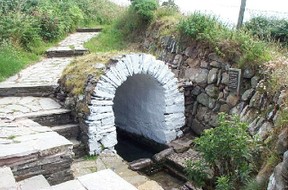 The official telling of his birth is not pleasant. His mother, Non, was the daughter of a Ceredigion chieftain, over in the Pagan stronghold of West Wales. She was either seduced or raped by Sandde, then fled pregnant into the mountains.
The official telling of his birth is not pleasant. His mother, Non, was the daughter of a Ceredigion chieftain, over in the Pagan stronghold of West Wales. She was either seduced or raped by Sandde, then fled pregnant into the mountains.
David was born on a cliff-top, overlooking wild Cardigan Bay, in a thunder-storm. The pain of child-birth was so acute that Non scourged marks in a nearby rock; and the elements were in sympathy too. As soon as David's head crowned, lightning flew from the blackened skies and split the rock in two. Thus was Wales's patron saint delivered.
(Whoever thought that the Welsh were soft have never looked closely at any of our legends and folklore.)
However, look at that story again from a wider context and you'll see more than childbirth going on. David was the person who brought Christianity to Wales. Sandde is the Welsh translation of the Latin sanctus; in other words, holy, sacred, God. David was a child of God.
History can stick a prefix to the name of his mother all it likes, but St Non still bears the name of the Mother Goddess of the Britons. (See Ynys Mon (Anglesey); River Dee; River Don; the Irish Danu/Tuatha de Danaan; Devon (Dee's River) etc.)
Even in the mainstream telling, her name has been linked with all of the Arthurian personae, usually as the daughter of Cynyr (Connor in the Irish legends; Sir Ector in the English). Her tutor may or may not have been Merlin. Her step-mother may or may not have been Anna, an early name for Morgan Le Fey. In short, David was born from the womb of Paganism, as a child of God.
Christianity violently impregnated Paganism, leaving the old religion to flee into the wilderness. David's birth nearly killed his mother. Is that a hint of witchcraft I scent, in the way that the elements fought back, trying to destroy the newborn David?
Just in case there were any doubts left here, it's worth noting the position of Capel St Non (St Non's Chapel). It's on a headland, in a field, surrounded by neolithic standing stones, and contains a pre-Christian holy well bearing the Mother Goddess's name.


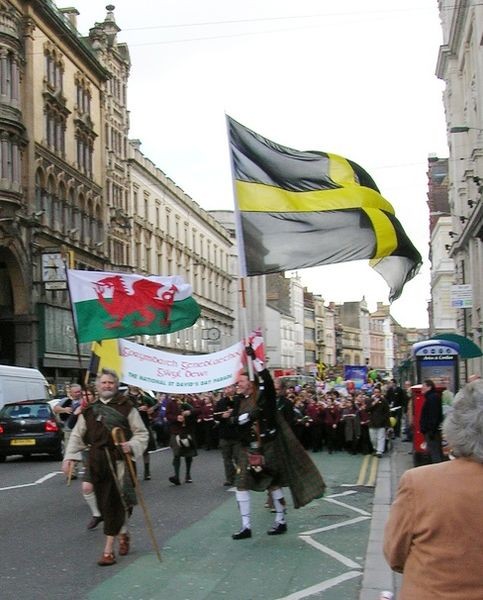

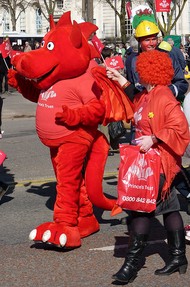 The Irish diaspora took St Patrick's Day around the world; but this isn't the only national Celtic saint's day being celebrated in March.
The Irish diaspora took St Patrick's Day around the world; but this isn't the only national Celtic saint's day being celebrated in March.





 The official telling of his birth is not pleasant. His mother, Non, was the daughter of a Ceredigion chieftain, over in the Pagan stronghold of West Wales. She was either seduced or raped by Sandde, then fled pregnant into the mountains.
The official telling of his birth is not pleasant. His mother, Non, was the daughter of a Ceredigion chieftain, over in the Pagan stronghold of West Wales. She was either seduced or raped by Sandde, then fled pregnant into the mountains.












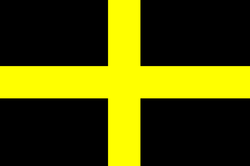

 St Tydecho's Churches in West Waleson 09/03/2014
St Tydecho's Churches in West Waleson 09/03/2014
 Goodies for an Outlander Premiere Partyon 03/06/2015
Goodies for an Outlander Premiere Partyon 03/06/2015
 Holocaust Memorial Day Interview with Rainer Höss, Grandson of Rudolf Architect of Auschwitzon 01/24/2015
Holocaust Memorial Day Interview with Rainer Höss, Grandson of Rudolf Architect of Auschwitzon 01/24/2015
 Romantic Valentine Gifts for an Outlander Fanon 01/16/2015
Romantic Valentine Gifts for an Outlander Fanon 01/16/2015


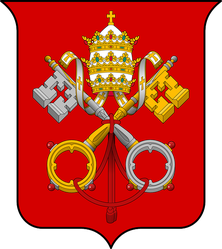
Comments | Sylwadau
I hope that this page was adequately illuminating. :)
A belated happy St David's Day to you.
Y croeso! <3 Dydd Gŵyl Dewi hapus!
Diolch yn fawr, cariad!
Brenda - Thank you very much. We'll keep a welcome in the hillsides for you.
Katie - I'm glad that they were useful. Are you fluent in Welsh now? :D
Very nice tribute to St. Davids day, I'm a bit Welsh. I really enjoyed the welsh language tutorial you've included, the maps, the welsh celebrations, the videos. A very nice tribute indeed.
Jo, you write such interesting articles. They make me want to visit that part of the world.
I'm definitely your woman for Welsh history! :D With St David's Day around the corner, I was thinking that I should have concentrated on all of that this week. I was just too busy writing about manga instead. >.< (Should work on that time management...)
As we speak, I'm writing another article about Mae Hen Wlad Fy Nhadau, the Welsh National Anthem. Better late than never.
Pontypridd is beautiful, even if I did nearly get killed last time I was driving up there. The Rhondda/Cynon roads do not led themselves well to getting home in a blizzard! Still, it's times like that you realise that you're a good driver. ;)
Some of my family are just down the road, in Blaenafon.
I love Wales. My son was at university in Treforest, Pontypridd. We have visited Wales many times. I've never been there for St David's day, perhaps I will one day. I knew nothing about St David until I read your article. it's strange, I have been thinking about finding out more about Welsh history. I saw a programme on TV recently and it talked a bit about Welsh history, I wanted to know more.
Ydy! Dydd Gŵyl Dewi hapus (ar gyfer Mawrth 1st!), cariad fi. <3
Ardderchog!!